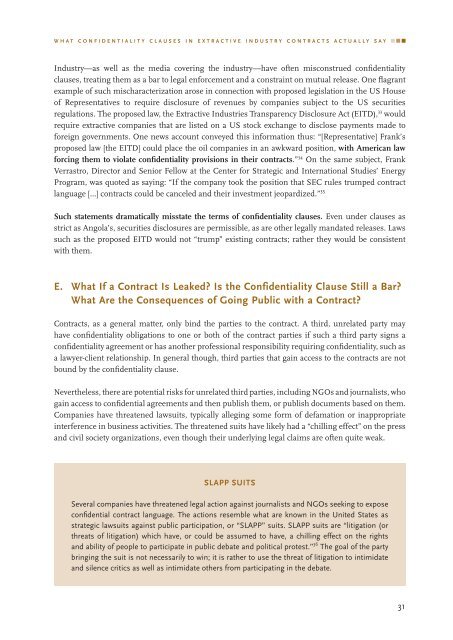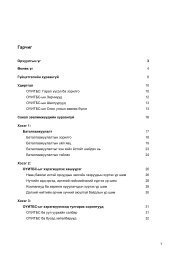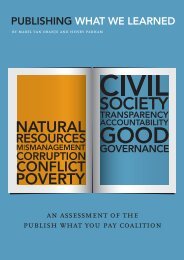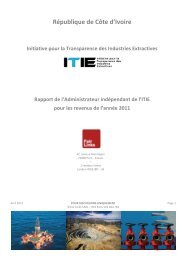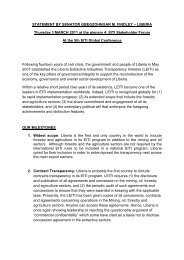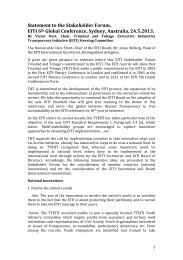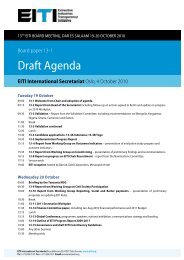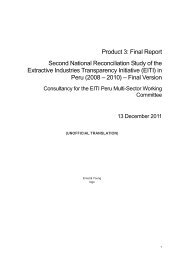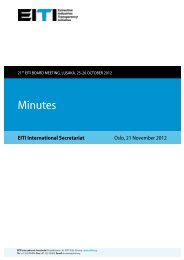CONTRACTS CONFIDENTIAL: - Good Law and Practice
CONTRACTS CONFIDENTIAL: - Good Law and Practice
CONTRACTS CONFIDENTIAL: - Good Law and Practice
Create successful ePaper yourself
Turn your PDF publications into a flip-book with our unique Google optimized e-Paper software.
WHAT <strong>CONFIDENTIAL</strong>ITY CLAUSES IN EXTRACTIVE INDUSTRY <strong>CONTRACTS</strong> ACTUALLY SAY<br />
Industry—as well as the media covering the industry—have often misconstrued confidentiality<br />
clauses, treating them as a bar to legal enforcement <strong>and</strong> a constraint on mutual release. One flagrant<br />
example of such mischaracterization arose in connection with proposed legislation in the US House<br />
of Representatives to require disclosure of revenues by companies subject to the US securities<br />
regulations. The proposed law, the Extractive Industries Transparency Disclosure Act (EITD), 33 would<br />
require extractive companies that are listed on a US stock exchange to disclose payments made to<br />
foreign governments. One news account conveyed this information thus: “[Representative] Frank’s<br />
proposed law [the EITD] could place the oil companies in an awkward position, with American law<br />
forcing them to violate confidentiality provisions in their contracts.” 34 On the same subject, Frank<br />
Verrastro, Director <strong>and</strong> Senior Fellow at the Center for Strategic <strong>and</strong> International Studies’ Energy<br />
Program, was quoted as saying: “If the company took the position that SEC rules trumped contract<br />
language [...] contracts could be canceled <strong>and</strong> their investment jeopardized.” 35<br />
Such statements dramatically misstate the terms of confidentiality clauses. Even under clauses as<br />
strict as Angola’s, securities disclosures are permissible, as are other legally m<strong>and</strong>ated releases. <strong>Law</strong>s<br />
such as the proposed EITD would not “trump” existing contracts; rather they would be consistent<br />
with them.<br />
E. What If a Contract Is Leaked? Is the Confidentiality Clause Still a Bar?<br />
What Are the Consequences of Going Public with a Contract?<br />
Contracts, as a general matter, only bind the parties to the contract. A third, unrelated party may<br />
have confidentiality obligations to one or both of the contract parties if such a third party signs a<br />
confidentiality agreement or has another professional responsibility requiring confidentiality, such as<br />
a lawyer-client relationship. In general though, third parties that gain access to the contracts are not<br />
bound by the confidentiality clause.<br />
Nevertheless, there are potential risks for unrelated third parties, including NGOs <strong>and</strong> journalists, who<br />
gain access to confidential agreements <strong>and</strong> then publish them, or publish documents based on them.<br />
Companies have threatened lawsuits, typically alleging some form of defamation or inappropriate<br />
interference in business activities. The threatened suits have likely had a “chilling effect” on the press<br />
<strong>and</strong> civil society organizations, even though their underlying legal claims are often quite weak.<br />
SLAPP SUITS<br />
Several companies have threatened legal action against journalists <strong>and</strong> NGOs seeking to expose<br />
confidential contract language. The actions resemble what are known in the United States as<br />
strategic lawsuits against public participation, or “SLAPP” suits. SLAPP suits are “litigation (or<br />
threats of litigation) which have, or could be assumed to have, a chilling effect on the rights<br />
<strong>and</strong> ability of people to participate in public debate <strong>and</strong> political protest.” 36 The goal of the party<br />
bringing the suit is not necessarily to win; it is rather to use the threat of litigation to intimidate<br />
<strong>and</strong> silence critics as well as intimidate others from participating in the debate.<br />
31


